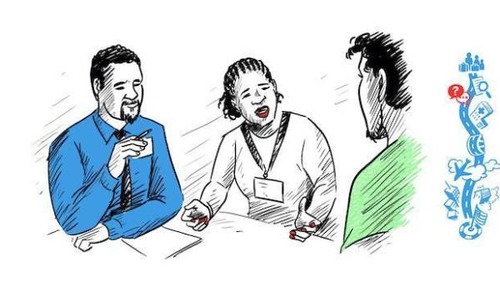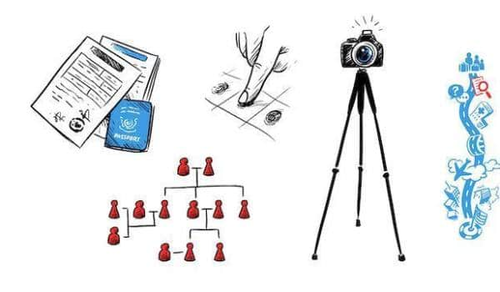Step 2: USCIS Interview

USCIS Interview
A USCIS officer will ask you many of the same or similar questions that you answered in the prescreening interview, and you will need to explain again how and why you became a refugee. When you meet with the USCIS officer, they will have read your entire file including all the information you provided during your prescreening interview. The USCIS officer will still need to verify the information you provided and ask you additional questions to determine whether you are eligible for resettlement. It is your obligation to be honest. You will be asked to swear under oath that everything you say during this interview is true. Your request for resettlement in the U.S. will be decided based on your testimony and other available evidence. To be eligible for admission to the United States as a refugee you must be truthful. Failure to tell the truth can result in a denial of your application.
As with the prescreening interview, interpretation will be provided by the RSC. RSC interpreters are highly trained and professional. The interpreter’s responsibility is to help you and the USCIS officer communicate. The interpreter will not add to or leave out any part of your story. They will repeat everything you and the USCIS officer say and change nothing in the meaning of your words. If you have concerns about the accuracy of the interpretation, please communicate this to the officer. At any time during this interview, you may ask any questions or request that the USCIS officer repeat or rephrase a question if you do not understand or if something is unclear.
If your contact information such as address, email, phone number, and U.S. tie information has changed since your prescreening interview, you will need to confirm all updated information at this time. If you were not fingerprinted on the day of your prescreening interview, everyone age 14 and older will also be fingerprinted during this visit.
USCIS will make the decision about whether you are eligible for resettlement to the United States. The RSC staff and interpreters are not involved in this decision in any way. You will not find out the result of your interview on the day you complete your interview. Once USCIS has made a decision about your case, the RSC will notify you of the decision. You will receive one of the following three decisions:
- Your case is eligible for resettlement to the United States;
- Your case is NOT eligible for resettlement to the United States;
- More time is needed to investigate your eligibility.
If you are informed that your case is eligible or that more time is needed to make a decision, your application will continue to move forward in the process. However, every case is subject to security checks throughout the entire process. Case decisions can change at any time.


Frequently Asked Questions
Come to your USCIS interview with whatever identifying documentation you have for yourself and all family members on your case, even if you already brought these documents to the prescreening interview. You should bring the originals of any documents you have; if you do not have the originals, bring copies.
Below is a list of documents that may be useful at your USCIS interview:
- UNHCR refugee certificates / UNHCR refugee ID cards / UNHCR registration documents
- Passports or travel documents (including expired travel documents)
- National identification cards
- Citizenship certificates
- Temporary identification cards for foreigners
- Birth certificates
- Marriage licenses
- Divorce documents
- Custody documents
- Adoption documents
- Death certificates, if relevant to the persecution claim
- Religious documents (baptism, marriage, temporary marriage certificate, death)
- Employment documents, if relevant to your refugee claim
- Educational documents/diplomas
- Important medical documents (findings and prescriptions)
- Medical form with a due date in case of pregnancy
- Threat letters
- Police/military summoning letters
- Court documents for any crimes you have been charged with or convicted of, anywhere in the world
- Media publications regarding your case (newspaper articles, relevant e-mails)
- Military papers and other documents such as identification cards, certificates, military discharge, or permit to carry weapons
- Red Cross certificate (in case of being registered as a prisoner of war)
- Recommendation letters, if relevant to your claim
- Names, addresses, and phone numbers of U.S. ties (friends and relatives already living in the United States)
You may have a long wait at the RSC before and after your interview. RSC staff will make this time as comfortable for you as possible, but your patience will be appreciated. If you have questions or concerns while you are waiting, please address them to RSC staff or security officers in the waiting area.
Your children may not be left unattended at any time. Please bring snacks for your children, diapers (if needed), and toys or other activities to keep them occupied.
You will be escorted from the waiting area to your interview by an interpreter or RSC staff member. Note that interpreters have been instructed not to speak with you about your case. Please direct all your case inquiries to your caseworker or the USCIS Officer.
You will be interviewed by a specially trained officer from USCIS. In order for these officers to make a decision about your eligibility for resettlement, there are many questions you must answer. We understand some of these questions may be difficult for you to answer. We appreciate your patience with this process.
There will be an interpreter in the room with you. The interpreter’s responsibility is to help you and your USCIS officer communicate. The interpreter will not add or leave out any part of your story. They will interpret everything you and the USCIS officer say and not change the meaning of your words.
Once you have completed your interview, you will be escorted back to the waiting area while your application is reviewed. You will be informed by RSC staff when you may leave the RSC or interview location. Please DO NOT leave before you are notified.
The result of your interview will not be shared with you immediately following your interview. It may be several months before you are notified of the USCIS interview results.
There will be one of three outcomes following your USCIS interview:
- United States and processing will continue to the next step;
- More time is needed to investigate your eligibility, and your case may continue to the next step;
- Your case is NOT eligible for resettlement to the United States. If you receive this outcome, you may be eligible to file a Request for Review, which is like an appeal. If so, you will be provided with instructions on how to do so when you are informed of this decision.
All applicants are subject to security checks throughout the entire process and decisions may change.
Your application will not be forgotten or lost.
A prescreening interview is conducted by a caseworker, who is an employee of the RSC. This person is not a U.S. government employee. During a prescreening interview, the RSC caseworker collects information for the application forms and security clearance process and records your statement about why you fled your country of origin. The information collected by the RSC is then shared with USCIS.
During the USCIS interview, a USCIS officer will review the information that was previously collected and interview all the members of your case. The USCIS officer and his or her supervisor, in consultation with USCIS headquarters in Washington, DC, will make a decision about your eligibility for resettlement to the United States through the USRAP.
RSC caseworkers and interpreters are facilitators, not decision-makers. The decision regarding your eligibility for resettlement to the United States is undertaken solely by USCIS. RSC staff and interpreters are not involved in this decision.